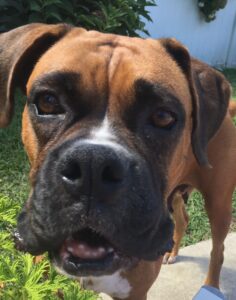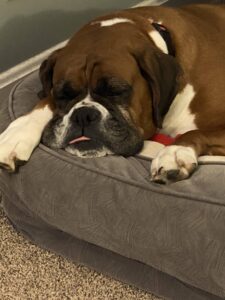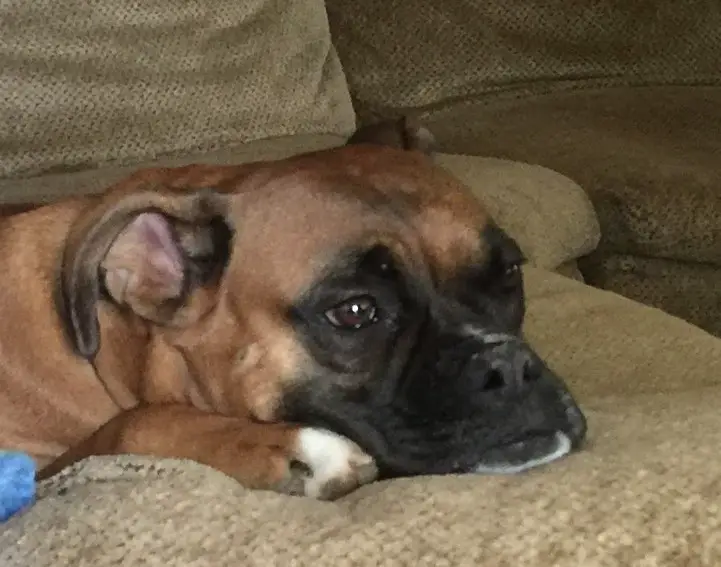This post contains affiliate links. See our Affiliate Disclosure Statement page for more details.
Table of Contents
Boxer Dog Not Eating
Boxer dog not eating? Most Boxer dog owners know that Boxer dogs love to eat and have a voracious appetite. So, when a Boxer dog suddenly stops eating there is often cause for concern. Is it due to s serious health issues or an emotional issue?
Boxer Dog Not Eating – 9 Common Causes
If a Boxer dog either suddenly or gradually stops eating there are 9 common causes for their lack of interest in food. These causes can be divided into two classes which are
- Medical issues
- Injury or illness
- Dental problems
- Gastrointestinal issues
- Stress
- Anxiety
- Environment/Behavioral Issues
- Boredom
- Changes in Diet
- Contaminated Food or Water
- Travel
One of the first things to evaluate is the length of time your Boxer has not been eating, if it is a day or two, it may be an emotional issue that resolves on it its own.
However, if the Boxer dog has not eaten in several days, it is recommended that they visit their veterinarian so they can rule out any medical or dental issues that may be causing the Boxer not to eat.
***Note – I am not a veterinary professional. The medical information discussed below is based on research conducted and veterinary sources cited. If you suspect your dog has a medical condition, seek help from a trained veterinarian or trained veterinary professional.
Boxer Dog Not Eating- Medical Issues
There are a number of medical issues that are inherent in Boxer dogs. These include
- Gastrointestinal Issues
- Allergies – Both Food and Skin
- Cancers
- Pancreatitis
- Liver or Kidney Disease
- Dental Problems
If you suspect a medical reason for your Boxer dog not eating it is imperative that they are seen by their veterinarian as soon as possible.
For more information on Boxer Food Allergies, read our post on How to Select The Best Dog Food For Boxers With Skin Allergies
Boxer Dog Not Eating – Gastrointestinal Issues
There are a number of specific Gastrointestinal Issues that can affect Boxer dogs. These include
- Inflammatory Bowel Disease (IBD)
- Gastric Dilatation Volvulus (GDV)
- Exocrine Pancreatic Insufficiency (EPI)
- Pancreatitis
- Colitis
Boxer Dog Not Eating – Inflammatory Bowel Disease
You may have heard or seen commercials discussing Irritable Bowel Disease (IBD) and its impact on people’s daily lives.
IBD is not only a human condition but a condition your Boxer dog may experience as well. But what exactly is IBD?
According to VCA Animal Hospital, IBD in dogs is
“Inflammatory bowel disease (IBD) is a syndrome rather than a disease. The syndrome is caused by a specific reaction to chronic irritation of the intestinal tract. Whatever the cause, the result is that the lining of the intestine is invaded by inflammatory cells. An allergic-type response then occurs within the intestinal tract. This inflammation interferes with the ability to digest and absorb nutrients.“
Source: Inflammatory Bowel Disease in Dogs, VCA Animal Hospitals, Llera, Williams, and Ward
The authors go on to state that the cause of IBD in dogs is unclear but it may be attributable to bacterial or parasitic infections or an allergic response to a protein in the dog’s diet.
For Affordable Pet Insurance for Your, Boxer Visit Odie Pet Insurance for affordable plan options.
Affordable Pet Health InsuranceBoxer Dog Not Eating – What Are The Symptoms of IBD in Dogs
The most common symptoms of IBD in dogs include
- Vomiting
- Diahrrea
- Combination of diarrhea and Vomiting
- Lack of appetite
- Overeating
IBD will need to be diagnosed by a veterinarian and a pathologist.
The veterinarian will conduct an endoscopy, which is a camera that is fed down the esophagus to examine the linings of the stomach and the esophagus for signs of inflammation or damage.
The veterinarian will conduct this test if they suspect the stomach is involved because the dog has been vomiting.
If your dog is presenting with chronic diarrhea, your veterinarian may do exploratory surgery to take tissue samples from the intestines.
The tissue samples will be evaluated by a Pathologist who will look for signs of inflammation in the tissue samples. These samples will be used to make a clinical diagnosis of IBD.
Treatments for IBD in dogs may include
- Antibiotics
- Probiotics
- Vitamins
- Immunosuppressive drugs
- Corticosteroids
- De-worming medications for parasites
Reference: VCA Animal Hospitals – Inflammatory Bowel Disease in Dogs Article
Boxer Dog Not Eating – Gastric Dilatation Volvulus (GDV)
What is Gastric Dilatation Volvulus? It is a life-threatening condition that can occur rapidly when a dog eats too much food too rapidly.
The amount of food consumed too rapidly can cause excess gas, and when combined with all the food in the stomach causes the stomach to rapidly expand.
If the stomach becomes too large it can twist on itself (gastric volvulus)and cut off the blood supply to the stomach and other essential organs.
According to the article Gastric Dilatation Volvulus, American College of Veterinary Surgeons, as Gastric Volvulus worsens, the following complications can occur
- Diminished respiration and cardiac output can lead to cell death in the liver, kidneys, and other vital organs
- Heart Arrhythmias (rapid heartbeat).
- The lining of the entire GI Tract is in danger of cell death.
- Potential Sepsis or Bacteria in the bloodstream
Boxer Dog Not Eating – Risk Factors for GDV
According to the American College of Veterinary Surgeons, there are several signs and symptoms of GDV
- Deep Chest
- One single large meal per day
- Older dog
- Related to other dogs that have had GDV
Other risk factors cited in the Gastric Dilatation Volvulus article include
- Elevated feeding
- Dogs that have had their spleens removed
- Large Breed Dogs
One of the key findings of a 2006 study the authors reference states “dogs fed dry dog foods that list oils (e.g. sunflower oil, animal fat) among the first four label ingredients predispose a high-risk dog to GDV.
Source American College of Veterinary Surgeons, Gastric Dilatation Volvulus
Boxer Dog Not Eating – Symptoms of GDV
- Enlarged Belly
- Drooling
- Vomiting without throwing anything up
It is very important that if you notice any of these symptoms, you contact your veterinarian immediately to seek treatment to allow rapid intervention.
Boxer Dog Not Eating – Treatment options
- Intravenous fluids
- Flushing the contents of the stomach
- Surgery
Boxer Dog Not Eating -Exocrine Pancreatic Insufficiency (EPI)
What is EPI? Exocrine Pancreatic Insufficiency occurs when the Pancreas doesn’t produce and secrete (exocrine) enough enzymes to transfer to the stomach and intestines to use to digest the macronutrients, Proteins, Fats, and Carbohydrates.
Boxer Dog Won’t Eat – Causes of EPI
According to VCA Hospitals in their article, Exocrine Pancreatic Insufficiency in Dogs, there are several factors that can cause EPI in your dog
- Congenital – your dog is born with it
- Inherited (Genetic)
- Result of an Infection, Illness or Injury
Visit Pet Assure for affordable Pet Insurance for your Boxer.
Click HerePlans starting at $6.58/monthBoxer Dog Won’t Eat – Symptoms of EPI
The authors of the VCA article point out signs and symptoms to look for in determining if your dog had EPI.
- Chronic Diarrhea
- Very soft, bulky-looking, fatty-looking feces
- Excessive appetites,
- Occasional Vomiting
- Weight loss over several months
Your veterinarian can evaluate and diagnose EPI in your Boxer by collecting, examining, and testing the feces.
According to the VCA article, there are several treatment options for your dog.
- Highly digestible low-fat diet
- Pancreatic enzyme replacement
- Possible treatment with an antibiotic if they have elevated Folate levels.
Boxer Dog Not Eating – Dental Care Issues

The Boxer breed is pre-disposed for oral care issues, some of which are genetic and others can be related to a lack of oral hygiene for the Boxer.
In the journal article Breed Predisposition on Oral Disease: Spotlight on the Boxer, Advent Veterinary Dental Surgery they identify the most common oral problem in Boxer dogs.
- Supernumerary teeth – too many teeth in the mouth causing overcrowding. Dogs should have 42 teeth
- Impacted Teeth – when a tooth gets lodged in tissue or bone
- Dentigerous Cyst – can occur when a tooth fails to erupt normally as the animal grows, often due to the tooth being impacted or embedded. Source: Dentigerous Cysts: Veterinary Dentistry Specialists
- Gingival Hyperplasia – abnormal growth of excess gum tissue. Source: Gingival Hyperplasia, VCAHospitals
- Fibromatus epulis and attrition – benign (noncancerous) mass-like growth in the mouth that typically grows over or around a tooth. Source: Epulis in Dogs (Benign Gum Growth), Pet MD
Since the boxer dog has the potential for a number of oral care issues, it is important to do weekly oral hygiene with your Boxer, regular teeth brushing, and give them dental treats to help prevent plaque and Tartar Buildup.
We recommend and use Purina Dentalife Daily Oral Care Large Dental Dog Treats, Greenies Regular Dental Dog Treats from Chewy.com
Boxer Dog Not Eating – Stress and Anxiety
Boxers are an emotional breed and can get stressed or anxious easily which leads them to not eat. Some common causes of stress and anxiety include
- Owners are traveling and Boxer has a house sitter or goes to a kennel
- Separation Anxiety – a large incidence of this occurred after the COVID restrictions and owners returned to work. The boxers were used to having their family in the house all day.
- Thunderstorms or Wind Storms
- Strangers in the house doing work for an extended period of time – Remodelers, Interior Designers, Electricians, etc.
- Children leaving for college
- Introduction of a new dog in the house.
If you notice your Boxer is not eating and appears stressed or anxious, it is recommended that they visit their veterinarian to have them evaluated and a plan of action developed so they resume their normal eating routine.
This may include medication, behavioral training, or therapy to help them manage their stress and anxiety.
If your Veterinarian recommends medications, we recommend and use PetCareRx, they offer discounts, fast free shipping, and great customer service. The link below has savings and a free shipping program with their PetCareRx program.
Shop with PetPlus! Get up to 40% off sitewide, unlimited free shipping and more with the annual savings program only at PetCareRx.com!Our Boxer Dog Duke dislikes thunderstorms, he begins to pant, and pace around the room. We have learned some behavioral training techniques that have been able to help him when thunderstorms arise.
Visit Kelly and Hugo for online courses on Moderating Your Dog’s Behavior and Animal Psychology to help your dog with Stress and Anxiety.
Boxer Dog Not Eating – Environmental and Behavioral Factors
Boredom

Boxers are high-energy, Intelligent, and Emotional dogs that need daily physical activity and mental stimulation to be healthy, happy, and calm.
When Boxer dogs do not get enough of either daily physical activity or mental stimulation they can easily become bored and develop destructive behaviors like chewing and digging.
To prevent boredom, it is best to have scheduled time for activities, both physical and mental with your Boxer.
Ensuring they receive enough physical and mental stimulation will help to ensure your Boxer will be happy and in a good emotional state.
For additional information on mental stimulation for your Boxer, read our article 9 Best Ways To Mentally Stimulate Your Boxer Dog For a Happy, Obedient Companion.
For additional information on Boxer Dog exercise read our articles,
- Boxer Dog Exercises – 3 Best Types of Exercise From Boxer Puppy to Senior Dog
- 7 Best Calorie-Burning Exercises for Boxer dogs And Their Owners
- How To Tire Out A Boxer Dog – 5 Best Ways To Have A Calm, Healthy Boxer Dog
To mentally Stimulate your Boxer we use and recommend the Starmark Treat Dispensing Chew Ball from Chewy.com. For Exercise, we recommend the Chuckit Fumble Fetch Ball and the ChuckIt Ball Launcher – Regular from CherryBrook.
Boxer Dog Not Eating – Changes in Diet
Just like humans, anytime you change what you are eating it can have either positive or detrimental effects on your digestive tract.
The same holds true for Boxer dogs. A change in diet can cause unwanted consequences due to the ingredients in the food. These can include
- Excess gas from additional fiber in the food
- itching, scratching, and chewing due to a food allergy from a new ingredient
- Different flavors and textures from their normal food
- Completely different diet – going from Kibble to homemade or fresh/frozen food or to all-natural ingredients.
It is always best to transition to a new diet slowly so if your Boxer not eating, it may be related to one of the factors above.
This is especially important if you begin to notice food allergies to the new diet regimen.
50% off Sampler Variety Box Take 50% off Your First Order of Nom NomBoxer Dog Not Eating – Contaminated Food or Water
Boxer Dog not eating? It may be because their food or water is spoiled and has a bad odor that the Boxer can detect.
Check the food for expiration dates to ensure they fall within the recommended guidelines. Also check for damaged, broken seals or broken containers which may lead to contamination.
Our Adopted Puppy Mill Boxers would often spill their food before deciding to eat it. This was because when they were at the puppy mill they were kept outside in the elements, and rarely fed.
When food was available it was often contaminated with bugs or mice. So they would know the food over to make sure there were no insects or mice in their food.
Boxer Dog Not Eating – Travel
If you take your Boxer dog on trips with you for your annual vacation to the beach with family and/or friends, your Boxer may not eat for the first day or two.
This may be because they are anxious about their new surroundings and maybe different people, sounds, and smells in their new location.
They may feel anxious that they will be left at their new location.
Spend some time on a daily basis exercising your Boxer and providing time for mental stimulation. This will help to calm and alleviate any anxiety they are having so they can resume their normal eating routine.
Boxer Dog Not Eating – Summary
If your Boxer is not eating, it may be due to a medical or environmental/behavioral condition or a combination of both.
If you suspect a medical condition is involved in your Boxer not eating it is recommended that you schedule a visit to the veterinarian as soon as possible to have your Boxer evaluated.
The same holds true if they have not eaten in several days and are not acting like themselves. This may be a sign of anxiety or depression that needs intervention from a veterinary professional.
Short-term/intermittent eating may be caused by factors as simple as boredom. Make sure to spend time daily exercising and providing mental stimulation for your Boxer dog so they can be happy, healthy and calm.

Discoverboxerdogs.com are Mary and Chris Kustanbauter. We reside in Red Lion, PA with our two Boxers, Duke and Katie, who are both rescue dogs. We have been working with Adopt A Boxer Rescue for the past 17 years and have adopted 5 Boxers from this fine organization. To learn more visit our Home, Boxer Dog Family, and Blogs Pages Visit us on social media on Facebook – Discoverboxerdogs.com, Instagram, and Pinterest.


